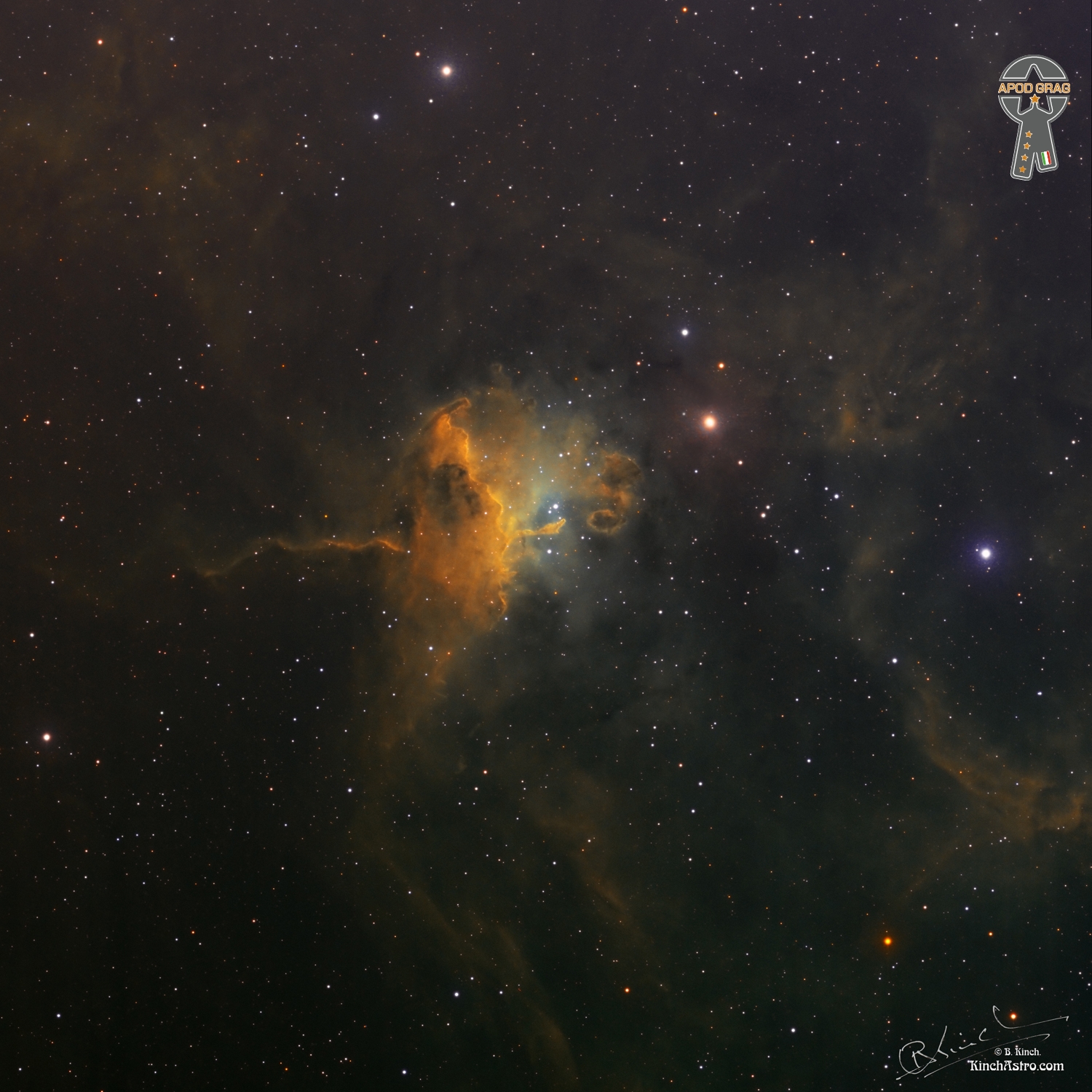Blog
IC 417 was discovered on 25 September 1892 by the German astronomer Max Wolf. It is an emission and reflection nebula with an embedded star cluster, which is part of an extensive H-II nebula complex and star formation region in the Auriga constellation. The age is estimated to be less than 3 million years.

Claude Hudson “Butch” Trucks (May 11, 1947 – January 24, 2017) was an American drummer. He was best known as a founding member of The Allman Brothers Band, for which he was inducted into the Rock and Roll Hall of Fame in 1995. Trucks was born and raised in Jacksonville, Florida. He played in various groups before forming the 31st of February while at Florida State University in the mid-1960s. He joined the Allman Brothers Band in 1969. Their 1971 live release, At Fillmore East, represented an artistic and commercial breakthrough. The group became one of the most popular bands of the era on the strength of their live performances and several successful albums. Though the band broke up and re-formed various times, Trucks remained a constant in their 45-year career. Trucks died of a self-inflicted gunshot wound on January 24, 2017. Claude Hudson Trucks was born on May 11, 1947, in Jacksonville, Florida. His father was an optician. He first discovered his talent at drumming when prompted by a band director at Ribault Junior High: “The band director gave three of us sticks and said, ‘Play me something,'” he recalled. He then attended Jean Ribault High School, where he was made first chair as a freshman.
more...Carla Bley (born Lovella May Borg; May 11, 1936) is an American jazz composer, pianist, organist and bandleader. An important figure in the free jazz movement of the 1960s, she is perhaps best known for her jazz opera Escalator over the Hill (released as a triple LP set), as well as a book of compositions that have been performed by many other artists, including Gary Burton, Jimmy Giuffre, George Russell, Art Farmer, John Scofield and her ex-husband Paul Bley.
Bley was born in Oakland, California, United States, to Emil Borg (1899–1990), a piano teacher and church choirmaster, who encouraged her to sing and to learn to play the piano, and Arline Anderson (1907–1944), who died when Bley was eight years old. After giving up the church to immerse herself in roller skating at the age of fourteen, she moved to New York at seventeen and became a cigarette girl at Birdland, where she met jazz pianist Paul Bley. She toured with him under the name Karen Borg, before she changed her name in 1957 to Carla Borg and married Paul Bley the same year adopting the Bley name. He encouraged her to start composing. The couple divorced in 1967, but she kept his surname professionally.
more...Carlos Eduardo Lyra Barbosa (born 11 May 1933) is a Brazilian singer and composer of numerous bossa nova and Música popular brasileira classics. He and Antonio Carlos Jobim, were the first two music composers, together with lyricists Vinicius de Moraes and Ronaldo Boscoli, to be recorded by João Gilbertoon his first LP entitled Chega de Saudade (1959), which was called the first generation of Bossa Nova.
more...Frederick Roach (May 11, 1931 – October 3, 1980) was an American soul jazz Hammond B3 organist born in The Bronx, New York, United States. Roach’s first commercial recordings were with saxophonist Ike Quebec for Blue Note Records in the fall of 1961. These sessions produced Quebec’s albums Heavy Soul and It Might as Well Be Spring. In March of 1962, Roach recorded as a backing musician for the Thunderbird album by Willis Jackson. From 1962-64, Roach recorded 5 albums as a leader for Blue Note, and also recorded with Donald Byrd on the album I’m Tryin’ to Get Home. Roach’s original writing, steady basslines, and highly musical fleet-fingered right hand set him apart From 1966-67 he recorded three more albums as a leader for Prestige Records, which are in a more commercial vein than his Blue Note dates. Roach’s Prestige albums were his last commercial recordings.
Dean Rudland, in the liner notes to a CD reissue of Roach’s Prestige albums Soul Book and Mocha Motion, wrote that Roach moved to Paris in the 1970s and worked as an arranger for Oliver Lake’s big band. Roach can be heard reciting one of his own poems on a 1974 album by jazz bassist Bob Reid titled Africa Is Calling Me: A Modern Day Black Opera (Kwela Records, 30K010), which was recorded in Paris and featured Oliver Lake.
Roach reportedly later moved to California to work in the film industry. He suffered a heart attack and died in 1980.
more...Seán Keane, one of the finest Irish folk music fiddlers, passed away on May 7, 2023. He was best known as the fiddler for the influential Irish and Celtic music band, The Chieftains.
Keane grew up in Drimnagh, a suburb of Dublin. He was born into a family with a rich musical heritage. His parents, both accomplished fiddle players, were revered members of the traditional music communities in County Longford and County Clare. Their home was a frequent destination for a multitude of traveling traditional players from all across Ireland, who performed in the bustling streets of Dublin. The Keane household became a veritable landmark in Dublin’s traditional music scene in the 1950s and 1960s, and it was here that Seán and his brother James, an accordion player, honed their craft.
Their summer trips to Longford and Clare further fueled their passion for traditional music and introduced them to an array of styles and techniques. These experiences were instrumental in shaping Seán’s musical direction and creative expression.
In 1968, Seán Keane made his foray into the world of professional music by joining the acclaimed Irish traditional music band, The Chieftains. With his virtuosic fiddle playing and his deep-seated passion for traditional music, he quickly became an integral member of the group. Seán’s contributions to The Chieftains’ discography, which spans several decades, are nothing short of remarkable.
more...https://www.legacy.com/us/obituaries/legacyremembers/isaac-russell-hart-obituary?id=51810909&fbclid=IwAR0VTSOvYdh3PApKtv7Vf0TseMNcrFGp7ryqxgHgo2YmlErm_WB_ft_E7qo

Fourth in a nine part series of Rhythm Roots Workshops at Cerenity Humboldt
Senior Care April 19th thru June 14th. https://cerenityseniorcare.org/cerenity-senior-care-humboldt-st-paul-mn/ in St Paul.

For ten years the stargazer dreamed of taking a picture like this. The dreamer knew that the White Desert National Park in Egypt‘s Western Desert is a picturesque place hosting numerous chalk formationssculpted into surreal structures by a sandy wind. The dreamer knew that the sky above could be impressively dark on a clear moonless night, showing highlights such as the central band of our Milky Way Galaxy in impressive color and detail. So the dreamer invited an even more experienced astrophotographer to spend three weeks together in the desert and plan the composite images that needed to be taken and processed to create the dream image. Over three days in mid-March, the base images were taken, all with the same camera and from the same location. The impressive result is featured here, with the dreamer — proudly wearing a traditional Bedouin galabyia — pictured in the foreground.

Donovan Phillips Leitch (born 10 May 1946), known mononymously as Donovan, is a Scottish musician, songwriter, and record producer. He developed an eclectic and distinctive style that blended folk, jazz, pop, psychedelic rock and world music (notably calypso). He has lived in Scotland, Hertfordshire (England), London, California, and—since at least 2008—in County Cork, Ireland, with his family. Emerging from the British folk scene, Donovan reached fame in the United Kingdom in early 1965 with live performances on the pop TV series Ready Steady Go!.
Having signed with Pye Records in 1965, he recorded singles and two albums in the folk vein for Hickory Records, after which he signed to CBS/Epic in the US—the first signing by the company’s new vice-president Clive Davis—and became more successful internationally. He began a long and successful collaboration with leading British independent record producer Mickie Most, scoring multiple hit singles and albums in the UK, US, and other countries. He emerged onto the scene in 1965 with three UK hit singles: “Catch the Wind“, “Colours” and “Universal Soldier“, the last written by Buffy Sainte-Marie. In September 1966, “Sunshine Superman” topped America’s Billboard Hot 100 chart for one week and went to No. 2 in Britain, followed by “Mellow Yellow” at US No. 2 in December 1966, then 1968’s “Hurdy Gurdy Man” in the top 5 in both countries, and then “Atlantis“, which reached US No. 7 in May 1969. The compilation Donovan’s Greatest Hits was released in March 1969 and peaked at No. 4 on the Billboard 200.
Donovan became a friend of pop and folk musicians including Joan Baez, Brian Jones, and the Beatles. He taught John Lennon a finger-picking guitar style in 1968 that Lennon employed in “Dear Prudence“, “Julia“, “Happiness Is a Warm Gun“, and other songs. His backing musicians included the Jeff Beck Group, and John Bonham, Jimmy Page and John Paul Jones, who later rose to fame as members of Led Zeppelin. Donovan’s commercial fortunes waned after parting with Most in 1969, and he left the industry for a time.
Donovan continued to perform and record sporadically in the 1970s and 1980s. His musical style and hippie image were scorned by critics, especially after the rise of punk rock. His performing and recording became sporadic until a revival in the 1990s with the emergence of Britain’s rave scene. He recorded the 1996 album Sutras with producer Rick Rubin and in 2004 made a new album, Beat Cafe. Donovan was inducted into the Rock and Roll Hall of Fame in 2012 and the Songwriters Hall of Fame in 2014.
more...David Thomas Mason (born 10 May 1946) is an English singer-songwriter and guitarist from Worcester, who first found fame with the rock band Traffic. Over the course of his career, Mason has played and recorded with many notable pop and rock musicians, including Paul McCartney, George Harrison, the Rolling Stones, Jimi Hendrix, Eric Clapton, Michael Jackson, David Crosby, Graham Nash, Steve Winwood, Fleetwood Mac, Delaney & Bonnie, Leon Russell, and Cass Elliot. One of Mason’s best known songs is “Feelin’ Alright“, recorded by Traffic in 1968 and later by many other performers, including Joe Cocker, whose version of the song was a hit in 1969. For Traffic, he also wrote “Hole in My Shoe“, a psychedelic pop song that became a hit in its own right. “We Just Disagree“, Mason’s 1977 solo U.S. hit, written by Jim Krueger, has become a staple of U.S. classic hits and adult contemporary radio playlists. In 2004, Mason was inducted into the Rock and Roll Hall of Fame as a founding member of Traffic. Within the same year, Mason started a new electric guitar company with business partner and industrial designer Ravi Sawhney
more...Márkos Vamvakáris (Greek: Μάρκος Βαμβακάρης; 10 May 1905 – 8 February 1972), was a rebetikomusician. He is universally referred to by rebetiko writers and fans simply by his first name, Márkos. The great significance of Vamvakaris for the rebetiko is also reflected by his nickname: the “patriarch of the rebetiko”.
more...Jimmy Ponder (May 10, 1946 – September 16, 2013) was an American jazz guitarist.
When Ponder’s brother entered the military, he left his guitar, and Ponder picked it up. In his early teens he received lessons from the guitarist in a band for which he sang doo-wop. He was drawn to the jazz guitar he heard on the radio. While playing in a rhythm and blues band, he occasionally inserted a jazz solo. He considered hearing guitarist Thornel Schwartz an important part of his life, when Schwartz was playing with organist Jimmy McGriff. He was impressed by Pat Martino when he saw Martino in the Jack McDuff band. He also cited as influences George Benson, Kenny Burrell, and Rene Thomas, though none surpassed the impact of seeing Wes Montgomery.
He learned the guitar solo from “Daily Double” (Quaker Town), the first 45 rpm single released by Charles Earland. When Earland performed in Pittsburgh, he invited Ponder to sit-in with the band and liked what he heard. Earland promised Ponder he could become a member of the band after he finished high school. Six months after graduating, he was hired by Earland.
more...
This new Hubble image shows NGC 1566, a beautiful galaxy located approximately 40 million light-years away in the constellation of Dorado (The Dolphinfish). NGC 1566 is an intermediate spiral galaxy, meaning that while it does not have a well defined bar-shaped region of stars at its centre — like barred spirals — it is not quite an unbarred spiral either (heic9902o). The small but extremely bright nucleus of NGC 1566 is clearly visible in this image, a telltale sign of its membership of the Seyfert class of galaxies. The centres of such galaxies are very active and luminous, emitting strong bursts of radiation and potentially harbouring supermassive black holes that are many millions of times the mass of the Sun. NGC 1566 is not just any Seyfert galaxy; it is the second brightest Seyfert galaxy known. It is also the brightest and most dominant member of the Dorado Group, a loose concentration of galaxies that together comprise one of the richest galaxy groups of the southern hemisphere. This image highlights the beauty and awe-inspiring nature of this unique galaxy group, with NGC 1566 glittering and glowing, its bright nucleus framed by swirling and symmetrical lavender arms. This image was taken by Hubble’s Wide Field Camera 3 (WFC3) in the near-infrared part of the spectrum. A version of the image was entered into the Hubble’s Hidden Treasures image processing competition by Flickr user Det58.

Aaron Corthen, better known as A.C. Reed (May 9, 1926 – February 24, 2004) was an American blues saxophonist, closely associated with the Chicago blues scene from the 1940s into the 2000s.
Reed was born in Wardell, Missouri, and grew up in southern Illinois. He took his stage name from his friend Jimmy Reed. He moved to Chicago during World War II, playing with Earl Hooker and Willie Mabon in the 1940s. He toured with Dennis “Long Man” Binder in 1956, and worked extensively as a sideman for Mel London‘s blues record labels Chief/Profile/Age in the 1960s, with Lillian Offitt and Ricky Allen, among others. He had a regionally popular single in 1961, “This Little Voice” (Age 29101), and cut several more singles over the course of the decade with Age, USA, Cool, and Nike Records.
more...Tania Maria (born May 9, 1948) is a Brazilian artist, singer, composer, bandleader and piano player, singing mostly in Portuguese or English. Her Brazilian-style music is mostly vocal, sometimes pop, often jazzy, and includes samba, bossa, Afro-Latin, pop and jazz fusion.
Born in São Luís, Maranhão, Brazil, Tania Maria began playing the piano at the age of seven, became a leader at the age of 13, when her band of professional musicians, organized by her father, won first prize in a local music contest and went on to play for dances, in clubs and on the radio. Her father, a metal worker and a gifted guitarist and singer, had encouraged her to study piano so that she could play in his weekend jam sessions, where she first absorbed the rhythms and melodies of samba, jazz, pop music and Brazilian chorinho. Since then, she has never worked in anyone else’s group. She has a degree in law, married early and had children.
more...More Posts
- No ICE
- Cosmo M1
- Mahmoud Ahmed
- Keith Jarrett
- Mary Lou Williams
- Robert Johnson
- World Music Kevin Qamaniq-Mason
- Daily Roots Montana
- The Drummers Path
- Bumble Bee Slim
- KARIBUNI Benedictine Living New Brighton performance
- Cosmo M81/82
- Bill Kreutzmann
- Jimmy Ruffin
- Nexhmije Pagarusha
- Pyotr Ilyich Tchaikovsky
- Johannes Brahms
- World Music Western Jazz Band
- Daily Roots Sir P.J.
- MAYDAY 2025 Congero